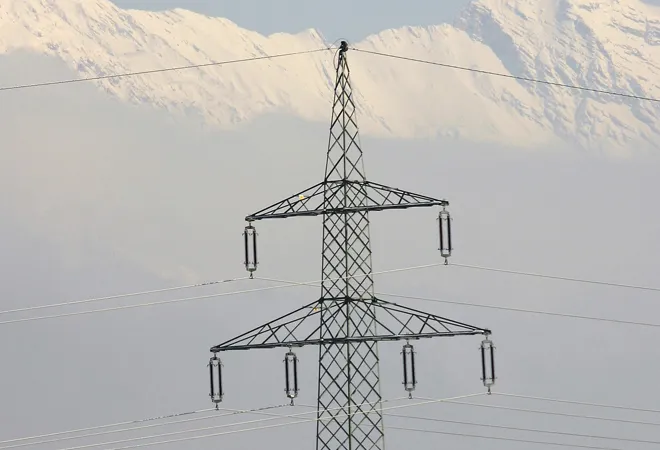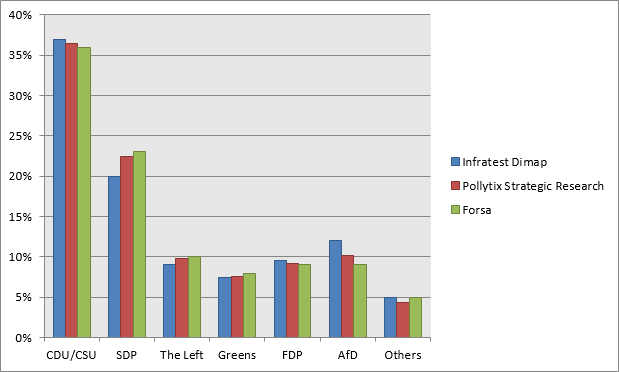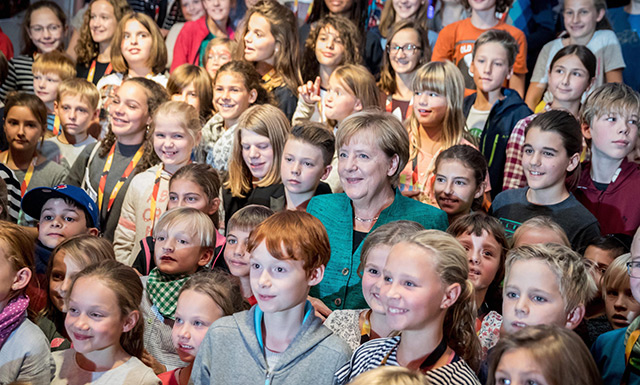
The Gordian question of future of the European project is disturbing leaders across European capitals. The German elections, scheduled for this Sunday (24 September) are the last major elections in Europe after which a clearer political picture will emerge for EU member states to thrash out the future direction of the European Project. While elections are an important event in democracy, in certain phases of history they become pivotal in charting the future not only of nation but the regional and global order.
In Europe, never have elections been such a closely watched phenomenon than it's now. A few months back, the Europhiles were tormented by the possibility of a Eurosceptic/right-wing nationalist party coming to power in France. Now the other half of the Franco-German motor goes to an election. Fortunately, Germany does not have Marie Le-Pen type threat looming on its electoral landscape. In German politics, 'moderation' scores among voters as the general public is vary of extreme ideologies. But the right-wing AfD (Alternative for Germany) will be entering the Bundestag as it is expected to get nine to twelve per cent of votes, according to opinion polls (Chart I). AfD could emerge as the third largest party in Bundestag after CDU and SPD. AfD remains untouchable partner and no party would be interested in forming coalition with it.
In an interview to Deutsche Welle, Chancellor Angela Merkel has already rejected the idea of forming coalition with AfD. Hence it would be safe to bet that AfD will not be part of any coalition. However, Germany will not go unscathed by the rise of AfD. After all, AfD has a support base and has been elected to all Lander parliaments and the European parliament. The presence of an extreme right-wing party in the Bundestag would impact German coalition politics as the mainstream parties look to fight the AfD threat.
Chart I: German Elections 2017, Voting Intention
 Source: Infratest Dimap, Pollytix Strategic Research and Forsa
Source: Infratest Dimap, Pollytix Strategic Research and Forsa
Christian Democratic Union (CDU) and its sister party Christian Social Union (CSU) are expected to emerge as a leading party and Angela Merkel could very well be poised to become the Chancellor. Its current coalition partner the Social Democratic Party (SPD) would be the second largest party. While in the heat of the election campaign, it would seem like CDU-SPD coalition may not be possible, the threat of AfD may prompt both the parties to come together and form the grand coalition. Both parties are pro-Euro and open to the idea of European Monetary Fund, while SPD is against fiscal austerity measures and calls for flexibility in Stability and Growth Pact, an idea which conservative economics of CDU does not accept yet they have managed to run a successful government.
 Angela Merkel at a kids press conference Berlin, 17 September
Angela Merkel at a kids press conference Berlin, 17 September
The presence of SPD in the coalition has made sure that the indebted economies of Southern Europe are not dealt with too harshly and Merkel's pragmatism ensured that Eurozone cohesion was of paramount importance than quibbles over economics. Yet, the CDU-SPD coalition may not come together precisely due to the rise of AfD. AfD has snitched away voters from the constituencies of all mainstream parties with exception to the Greens. Hence in order to connect and win back their traditional supporters, mainstream parties will look for ideological cohesion with coalition partners.
The emergence of AfD could trigger a conservative cohesion with CDU and FDP coming together and strengthening the conservative base. The pro-business FDP voter base of self-employed professional and business owner and the CDU/CSU's constituency of over 60 years Christian conservatives and middle class educated voters have similar interest in tax-cuts to boost spending and maintaining Germany's export competitiveness. Hence both the partners are likely to find common ground on many policies. The presence of FDP would make it tough to chart a future course of EU reform. FDP is more inclined towards a multi-speed EU and calls for a mechanism where a member can leave Eurozone without leaving the EU. FDP's opposition to European Monetary Fund to share risks among the Eurozone member, a proposal that French president Emanuel Macron had envisaged, and positions like removal Greece from Eurozone in return of debt relief and the strict implementation of sanctions pertaining to Growth and Stability pact will lead to difficulties for Merkel to work with the France and Southern European block. A CDU-FDP coalition would probably include Green Party as well in order to get the numbers. The presence of Greens in the Jamaica coalition (CDU-FDP-Greens) will temper down some of FDP's stand on slashing funds for renewable energy.
There could be collusion of forces on the left-liberal side with SPD-the Left. Chancellor Gerhard Schroeder's labour market reforms of 2003 under the Agenda 2010 program alienated many of lefts traditional working class bases some of which have drifted towards the Left or the AfD. Martin Schulz is fighting this campaign on rectifying the Schroeder legacy with focus on welfare and tax redistribution. The Left party with its voter base mainly in Eastern Germany will be an ideological companion for SPD. Considered as a pariah party due to its association with Eastern bloc, the Left has many years of experience at the regional level. SPD, led by Martin Schulz, the former president of the European Parliament, is strong supporter of European institutions. Therefore, SPD headed coalition is likely to bargain for a 'hard Brexit' than a more pragmatic Merkel led coalition. However, the more likely scenario would be a conservative cohesion since the Left's agenda is more radical than SPD and includes the scrapping of the European Investment Plan and financial austerity measures imposed on Greece. Such an agenda will lead to friction with the SPD, alienate Northern European countries and hamper European integration. SPD would prefer CDU or Greens over the Left party. The more probable scenario is conservative cohesion with CDU-FDP coming together.
While the AfD will not be in position to be part of a coalition, the rise of AfD will bring conservative forces together and impact the discourse of the Centre-right parties like the CDU. There is a likelihood that stronger narratives on migration issue and the EU-Turkey relations will emerge as the conservatives try to win back their support bases. Merkel has shown the dexterity as a leader that she has the skill to rein in the more conservative elements of CDU from falling to the temptation of slipping further right and while pursuing pragmatic foreign policy. If she gets another term as a Chancellor, the conservative wind will be stronger and she will need all her skills to chart a prosperous course for Germany and Europe.
The author is Research Assistant at Institute for Defence Studies and Analyses, New Delhi.
“Chancellor Angela Merkel: 'There is a clear disagreement with Trump on North Korea”, Deutsche Welle, September 20, 2017, URL: http://www.dw.com/en/chancellor-angela-merkel-there-is-a-clear-disagreement-with-trump-on-north-korea/a-40608769
The views expressed above belong to the author(s). ORF research and analyses now available on Telegram! Click here to access our curated content — blogs, longforms and interviews.




 Source: Infratest Dimap, Pollytix Strategic Research and Forsa
Source: Infratest Dimap, Pollytix Strategic Research and Forsa Angela Merkel at a kids press conference Berlin, 17 September
Angela Merkel at a kids press conference Berlin, 17 September PREV
PREV

